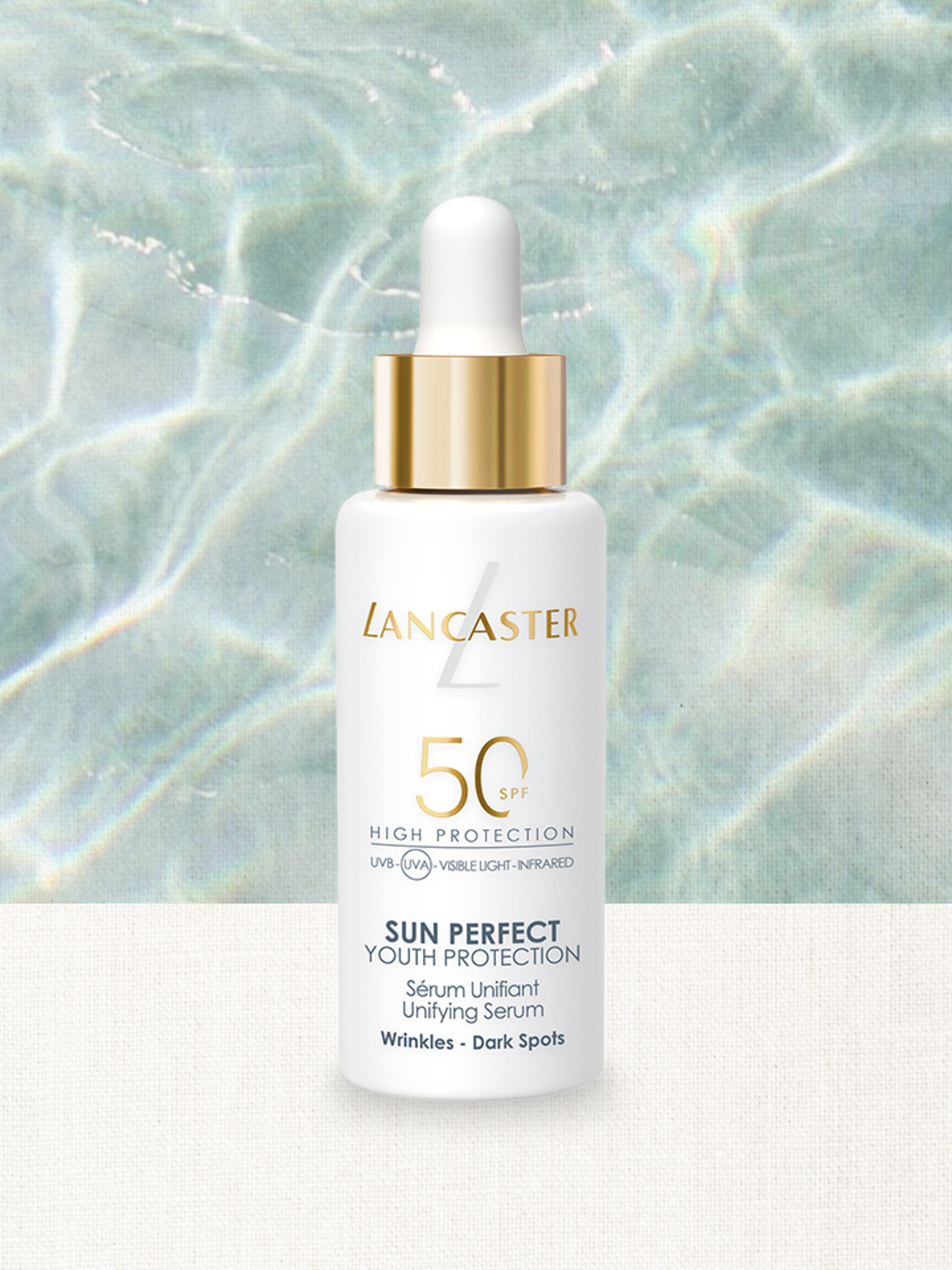
The Best Sunscreens to Wear All Year Round
Words by Tanya Small
Sunbathe or sunburn? It’s the ultimate summer dilemma, and we’re here to solve it. This SPF guide is designed to teach you how to enjoy the sun safely. Read on to discover our favourite SPF products of 2025, as well as suncare tips from the industry’s leading skincare experts and the answers to all your burning suncare questions.
Our Top SPF Products of 2025

Lancaster
Best Skincare-Infused SPF
If you’d prefer to incorporate your SPF into your skincare routine, try switching to Lancaster’s Sun Perfect Unifying Serum. It’s infused with SPF 50 and powered by vitamin C, hyaluronic acid and niacinamide to repair and protect against photo damage. That means less dryness, dark spots and fine lines.

SunsolveMD by TheSolveMD
Best SPF for All Skin Types
There’s no one-size-fits-all SPF – that’s why SunsolveMD has created a moisturiser for every skin type and concern. Each solution is infused with SPF 50, is water-resistant for up to 40 minutes and harnesses the power of the brand’s proprietary ZnO + Mineral Care Complex, which includes zinc oxide and marine phytoplankton to restore your skin’s barrier and address UV-induced DNA damage.

Augustinus Bader
Best Daily SPF
Consider this your SPF all-rounder. This protective serum from Augustinus Bader is lightweight and fast absorbing, making it ideal for daily use. Plus, thanks to the brand’s TFC8® complex, it protects against both UVA and UVB rays and supports the natural renewal of your skin cells, allowing for more effective repair after sun exposure.

Sisley
Best Hydrating SPF
Sunleÿa SPF50+ is a protective shield against photo-ageing for those who like to tan. It targets fine lines, as well as the loss of elasticity in your skin – both of which are accelerated during exposure to the sun. With your skin protected, you can enjoy a luminous tan without the worry of damaging your skin’s natural appearance.

EviDenS de Beauté
Best Collagen-Infused SPF Shield
It’s no secret that collagen is one of the skincare world’s star ingredients. The Total Shield SPF50 – PA++++ from EviDenS de Beauté is infused with the brand’s signature ingredient, The Triple Collagen, to firm and hydrate your skin. Plus, its lightweight, veil-like texture sits comfortably over your make-up, making it the perfect formula to re-apply throughout the day.

Decorté
Best Waterproof SPF
Thanks to its water-resistant formula, this Decorté SPF will become your new poolside favourite. Its formula is packed with botanicals, from antioxidant-rich eucalyptus to anti-inflammatory golden silk extract and firming marine collagen. For best results, apply it as part of your bodycare routine – giving extra attention to your neck, arms and legs.

Shiseido
Best All-Weather SPF
This powerful SPF 50 stick from Shiseido is a handy way to stay protected all year round while you’re on the go. Thanks to the brand’s SynchroShield™ technology, it offers enhanced protection when it meets water or heat. Plus, this new formula offers up to eight hours of sun protection.
What the Experts Say
Wear Sunscreen Daily
“Wear Sunscreen”, Baz Lurmann’s 1999 chart-topping song was no one hit wonder: 24 years on the sentiment is as important as ever. “Everyone should wear a broad-spectrum sunscreen regardless of age, gender or skin type. Just because you don’t burn doesn’t mean you’re not receiving UV damage from ageing UVA rays, which are the same strength all year round and can penetrate through windows. Your collagen actually starts to break down after just 10 minutes of being outside, even on a cloudy day,” says Dr Howard Murad, dermatologist and founder of Murad.
There Are Two Types of Protection
You will be able to tell whether a sunscreen is physical (also known as mineral) or chemical by looking at the inkey list on the back of the packaging. Physical sunscreen creates a barrier to deflect UV rays, and Dr Maryam Zamani recommends it for sensitive skins and children. “Physical SPFs include ingredients such as zinc oxide and titanium oxide – they can appear white and be thicker in texture.” Chemical, on the other hand, “are absorbed into the skin and scatter UV radiation. These sunscreens are thinner and require less product to protect skin, however they can clog pores and cause more irritation so best avoided by acneic skin types. These formulations include oxybenzone, oxtinoxate, and avobenzone.”
Every Skin Tone Needs SPF
“Darker skin tones are just as susceptible to the hazards of sun damage, such as hyperpigmentation and free radical damage,” says Dr Murad. Medical and cosmetic doctor Dr Ewoma Ukeleghe has some top tips: “For skin of colour, a key thing is making sure that your sunscreen doesn't leave an ashy cast. We can't be tolerating that any longer! Beware of physical sunscreens that contain a high concentration of metals such as zinc oxide, which typically give the product a white cast on application.” Double check the inkey list if you’re unsure.
Your Questions Answered
The protection factor highlights the level of protection against the sun, while UVB+UVA and PA showcase the protection against the damage caused by environmental factors, such as blue light and air pollution.
The British Skin Foundation recommends using an SPF higher than 30, and if you have a fair complexion, that rises to SPF 50. When properly applied, SPF 50 can block up to 98 per cent of all rays.
We recommend using two teaspoonfuls for your face and neck and six for your body.
For maximum protection, always remember to apply your SPF every two hours. This is where SPF mists come in handy, as they allow you to re-apply over your make-up.
In partnership with Lancaster, Sunsolve, Augustinus Bader, Sisley, EviDenS de Beaute, Decorte, Shiseido

